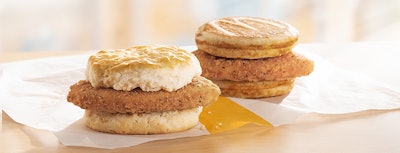
The golden arches are setting their own welfare commitments for suppliers to follow by 2024.
As part of the Poultry Sustainability & Welfare Summit in Atlanta, Janet Helms, sustainable sourcing & animal health and welfare manager for McDonald’s Corp., reviewed the quick-service restaurant chain’s upcoming commitment to work with its suppliers to achieve certain targets. She appeared on October 20, 2022, at the conference presented by the U.S. Roundtable for Sustainable Poultry & Eggs and the International Poultry Welfare Alliance.
Using a science-led and outcome-based approach, McDonald’s developed eight commitments concerning chicken animal welfare. It aims to implement them across 70% or more of its global supply chain by 2024.
The global food giant is one of a few who have not taken up a welfare commitment such as the Global Animal Partnership’s standards.
- Chicken sustainability advisory council: The chain launched a global chicken sustainability advisory council to create an action plan to support its commitments. Helms said it’s a global group of scientific and sustainability advisors.
- Measurably improve chicken welfare: McDonald's identified 15 key welfare indicators, and related targets, and committed to report on farm-level care across its largest markets. She said the company is collecting data from its suppliers to create a welfare database as well as other databases following metrics like antibiotic use.
- Commercial trials: McDonald's is launching commercial trials to measure the influence of lighting, space allowance and genetics on poultry performance. These trials compare different aspects of broiler welfare and sustainability so the company knows how these factors affect its supply chain.
- Enrichment and lighting: McDonalds is promoting natural behaviors such as pecking, perching and dust-bathing, with 100% access to floor litter and ample light in its supply chain. Helms said the company developed an enrichment and lighting guide with specific requirements that are resource-based rather than outcome-based.
- SMART Broiler project: The company committed $2 million to support the identification and advancement of on-farm chicken health and welfare monitoring technologies. The project is a collaborative effort with funding from the U.S. Department of Agriculture which aims to accelerate promising welfare technology.
- Controlled atmospheric stunning (CAS): McDonalds will fully transition its supply chain to the CAS method in the U.S. and Canada by 2024. Helms said the practice is already standard for its European supply chain.
- Third-party audits: Establish third-party audits to ensure suppliers comply with McDonald’s improved chicken welfare standards. These auditors would be on farm, she said, to support the work being done to enhance welfare.
- Measure feasibility: Conduct a study to measure the feasibility of extending commitments to remaining global markets. Helms said McDonald's is always looking at the feasibility of implementing these commitments across its global supply chain. One day, rather than 70% compliance it could reach 95% or even 100%. Right now, its focusing on the future of the supply chain in Africa, South America and the Asian Pacific region.

















